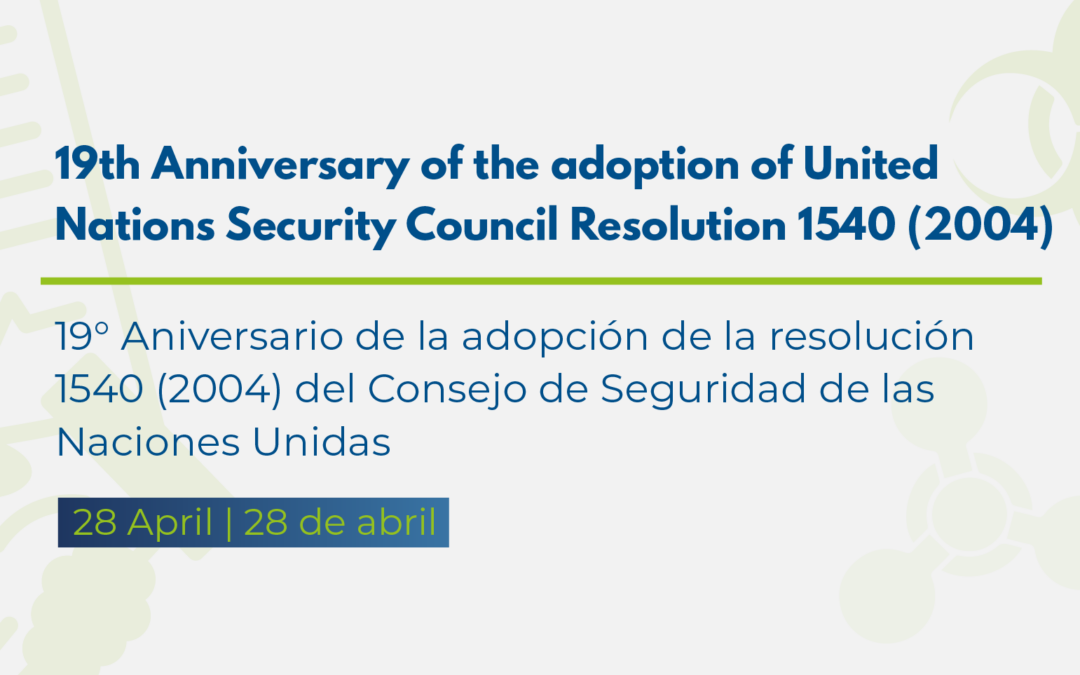Resolution 1540 (2004) was adopted on 28 April 2004 by the United Nations Security Council against a backdrop of growing concern by the international community regarding the proliferation of weapons of mass destruction (WMD) by non-state actors, and the threat posed to international peace and security.
With this in mind, resolution 1540 (2004) establishes a series of obligations for States to address this challenge and prevent the proliferation of WMDs and their means of delivery, and the illicit trafficking of related materials, by non-state actors, including terrorist organisations.
UNLIREC reiterates the importance of resolution 1540 (2004), and its full and effective implementation by all States. Furthermore, UNLIREC encourages the active participation of the private sector, scientific community and academia to join in these efforts.
What are the main obligations contained in resolution 1540 (2004)?
Resolution 1540 (2004) mandates States to refrain from providing support to non-state actors in the development, acquisition, manufacture, possession (etc.) of WMDs and their means of delivery. In order for resolution 1540 to be effectively implemented, States must also ensure that their legal frameworks prohibit the aforementioned activities.
In addition to this, States must establish national controls on related materials and dual-use goods, which are items that have legitimate and peaceful uses but which can also be used to develop WMD.
It is important that the private sector, scientific community and academia be aware of the risks involved in the trade and use of dual-use goods, and the importance of adequate controls.
Learn more about dual-use goods
Why is resolution 1540 important for Latin American and Caribbean States?
Resolution 1540 (2004) complements and reinforces existing treaties on disarmament and non-proliferation of WMDs, such as: the Biological Weapons Convention, the Chemical Weapons Convention, the Treaty on the Non-Proliferation of Nuclear Weapons, the Treaty on the Prohibition of Nuclear Weapons and the Treaty for the Prohibition of Nuclear Weapons in Latin America and the Caribbean (Treaty of Tlatelolco).
Moreover, this is the first time that the Security Council defined the proliferation of chemical, biological and nuclear weapons as a threat to international peace and security, in particular the risk posed by non-state actors acquiring such weapons.

No State is immune to the risk posed by the use or threat of use of WMD, or potential criminal activities by non-State actors, including terrorist organizations.
It is also important to note that countries in the region have industries that produce, assemble, export, import, transport and use dual-use materials. States are therefore responsible for ensuring that said goods and technologies are not diverted for the development of WMDs. It is important that States actively participate and cooperate in the international community’s non-proliferation initiatives.
What is the work of the 1540 Committee and its Group of Experts?
The 1540 Committee and its Group of Experts monitor the implementation of resolution 1540 (2004). They facilitate cooperation and technical assistance towards its effective implementation.
What role do regional and sub-regional international organisations play in the implementation of the resolution?
International, regional and subregional organizations play a fundamental role in the implementation of resolution 1540 (2004).
UNLIREC, as a United Nations regional centre specialized in disarmament and non-proliferation in Latin America and the Caribbean, supports national and regional efforts aimed at the effective implementation of this resolution and, therefore, the prevention of the proliferation of WMDs in the region.






